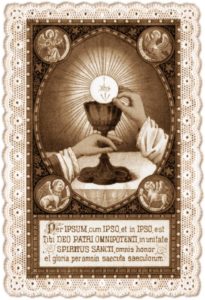Out with Doubt
We all strive for consistency in our lives, but when push comes to shove, the only thing we are really consistent at is being inconsistent.
 We have our routines that we try to follow, but amidst those there are a hundred little things that we cannot seem to keep straight. In response, we make resolutions that we cannot possibly keep, we make plans we cannot possibly fulfill, we make lists that are too long, all which serve to compound the problem.
We have our routines that we try to follow, but amidst those there are a hundred little things that we cannot seem to keep straight. In response, we make resolutions that we cannot possibly keep, we make plans we cannot possibly fulfill, we make lists that are too long, all which serve to compound the problem.
How often do we resolve, for instance, to say this Rosary well in restitution for saying the last forty so poorly (we think), but no sooner have we said the creed that distractions have betrayed us again? Even if a busy parent manages to escape the children for his or her own Rosary one day, there seems to be no escaping the thoughts on the cares of life; and one wonders sometimes if God would be okay with it if a stiff drink preluded the family Rosary.
But maybe we are not supposed to actually be so consistent, and that is because we tend to evaluate progress based on a very flawed view of perfection.
The spiritual life (and life itself) requires both discipline and fluidity. There are certain things we always need to be on top of, and there are other things we need not have so tight a grip on, because we cannot possibly do it all. In fact, we need to remember that we cannot do anything in the spiritual order without the help of God; the least advance requires His cooperation and grace.
Without Me, you can do nothing. There is no wiggle room there; it is absolute.
But these words of our Lord often can be a source of doubt in us.
This doubt does not have to do with the teachings of the Church, but rather something more fundamental. It amounts to doubting the personal love of Christ for each of us, which makes us think we are in constant opposition to Him. Being so inconsistent and downright fickle, it can be tempting to conclude that our Lord has no real interest in us. So we begin to withdraw from His friendship, flee His presence, and greet Him only from a distance like some passing acquaintance, rendering the narrow pathway to eternal life even narrower, the ascent far steeper than it is.
Christ’s seemingly negative statement of fact is really one that should prompt tremendous confidence and challenge all doubt.
If we can do nothing without Him, it means that He actually wishes for us to do all things with Him; He desires, even thirsts, to be involved in everything we do so as to turn even the most ordinary task, the daily struggle and cross, into a genuine partnership with Him.
 Recall the conclusion of the Canon at Mass: Through Him, with Him, in Him. That includes all of us.
Recall the conclusion of the Canon at Mass: Through Him, with Him, in Him. That includes all of us.
He is well aware of all circumstances that affect us, be it external, such as the volatile political climate we live in, or internal, such as the sin and concupiscence we struggle with most that makes us so inconsistent. He knows it all and still wishes our company because love is the basis of all consistency. And while our love may fail more often than we would prefer to admit, His never does.
In such dark days, we have to make more acts of belief in this reality, and so then go to Him with our struggling consistency, to which He will endeavor to perfect in His own way. Remember that Christ is far better at choosing the way to prove us rather than we trying to prove ourselves to Him. The first is done with Him, the second is on our own, to which we will always lose.
St. Teresa of Avila remarks that he who tries to carry too much ends up losing everything. Fortunately, we have Someone to make sure we don’t.
February 5, 2021








